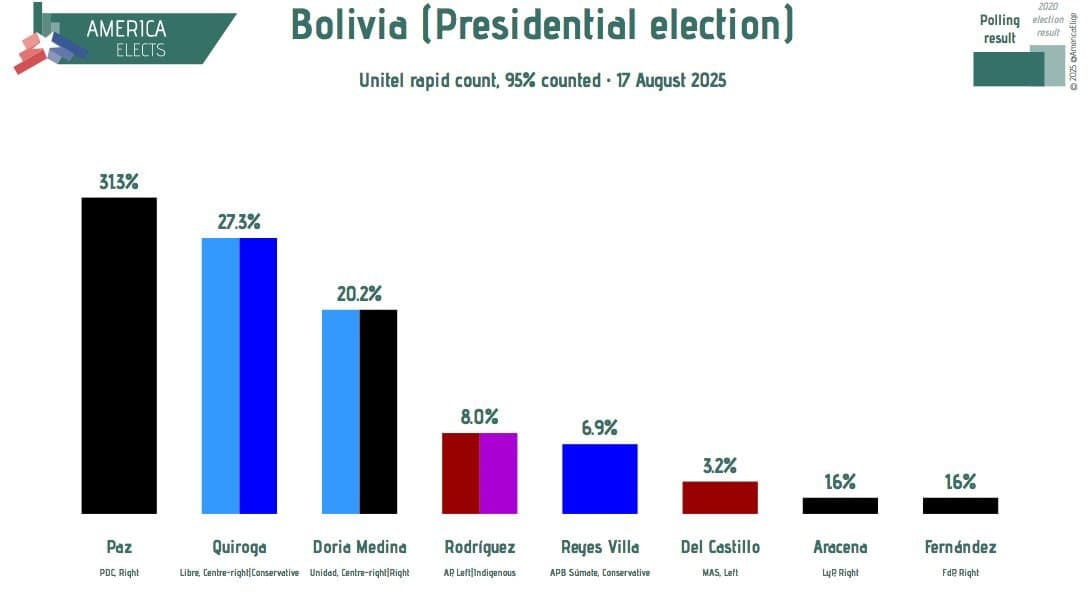Bolivia Shifts Right: Left-Wing Party Fails to Secure Top Five in Historic Elections
In a significant political shift, Bolivia has witnessed a dramatic change in its electoral landscape as the ruling left-wing party, the Movement for Socialism (MAS), failed to secure a position in the top five of the recent presidential elections. For the first time in nearly two decades, the ballot was dominated by right-wing candidates, marking a pivotal moment in the country’s political history.
Background & Context
The MAS party, which has been a dominant force in Bolivian politics since the presidency of Evo Morales in 2006, has seen a steady decline in its influence over recent years. The elections held on Sunday, October 15, 2023, have underscored this trend, with both the first and second place candidates emerging from the right. The ruling party"s candidate, who has not yet been named, was unable to secure even a top-five finish, indicating a significant shift in voter sentiment.
This election comes at a time when Bolivia faces various socio-economic challenges, including high inflation and widespread discontent over public services. The MAS party, which historically garnered support from the country’s indigenous population and working class, appears to have lost touch with its base, leading to calls for a reevaluation of its political strategies.
Key Developments
As the election results unfolded, the two leading right-wing candidates quickly emerged as frontrunners, capturing the attention of voters disillusioned with the MAS"s governance. Preliminary reports indicate that the conservative candidates focused on issues such as economic stability and security, resonating with an electorate eager for change.
Political analysts have noted that the MAS"s failure to adapt its platform to the evolving needs of Bolivians may have played a crucial role in its electoral downfall. “The MAS party has been criticized for its inability to address pressing issues like economic hardship and public safety,” said political expert Ana Maria Torres. “Voters are looking for solutions, and they found them in the right-wing candidates.”
Broader Impact
This electoral shift is not merely a change in leadership; it represents a broader ideological realignment in Bolivia. Historically, the country has oscillated between left and right, and this election could signify a long-term trend away from leftist policies. Experts warn that this shift could have implications for Bolivia"s international relations, particularly with countries that have supported left-wing governance in the region.
Moreover, the results signal potential upheaval within the MAS itself. As the party contemplates its future, internal strife may arise as factions debate whether to double down on traditional leftist policies or pivot towards a more centrist approach to regain lost support. The outcome has also ignited discussions around the role of social movements and grassroots organizations that previously supported the MAS, raising questions about their future influence in the political arena.
What’s Next
In the wake of these elections, all eyes will be on the newly elected officials as they outline their plans and policies. The incoming right-wing leaders will face immediate challenges, including addressing the economic crisis, promoting social stability, and managing public expectations for change. Their ability to deliver on campaign promises will be closely scrutinized by a populace eager for tangible results.
Additionally, the MAS party will need to engage in serious introspection and analysis of its electoral strategy moving forward. As previously reported in related coverage regarding political shifts in other regions, understanding the changing dynamics at play will be crucial for any party hoping to reclaim its former position of power. The political landscape in Bolivia is poised for transformation, and the coming months will be critical in shaping the country’s trajectory.




![[Video] Putin ready to refrain from deep strikes in Ukraine during elections](/_next/image?url=%2Fapi%2Fimage%2Fthumbnails%2Fthumbnail-1766158260919-wednc8-thumbnail.jpg&w=3840&q=75)


![[Video] Gunfire between Iraqi security forces and Sadr militias in Baghdad](/_next/image?url=%2Fapi%2Fimage%2Fthumbnails%2Fthumbnail-1768343508874-4redb-thumbnail.jpg&w=3840&q=75)
